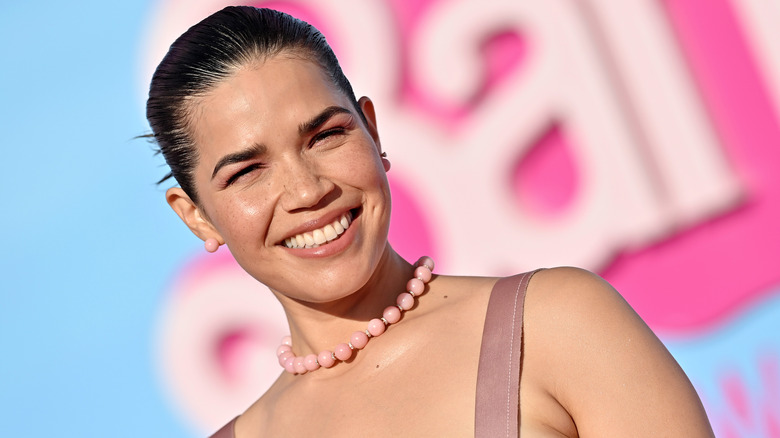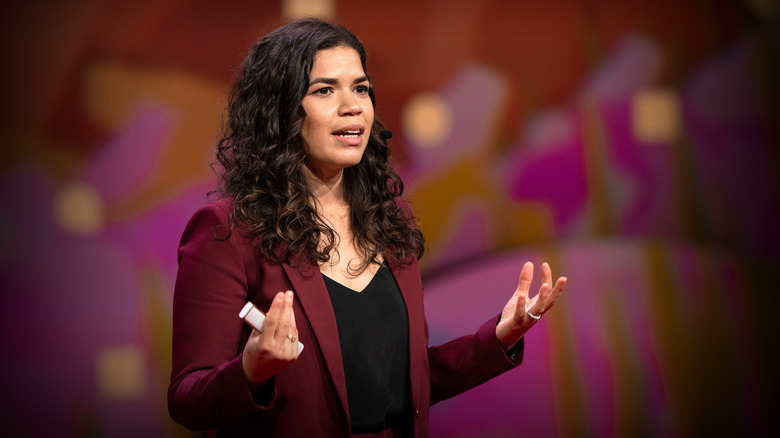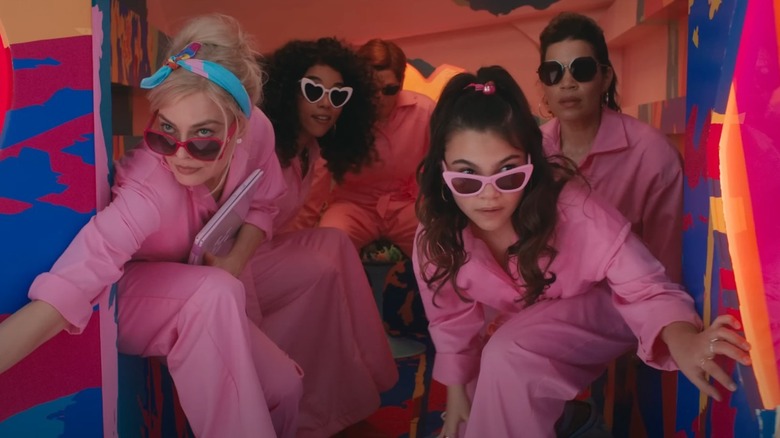America Ferrera's Big Barbie Monologue Is The Heartbreaking Sequel To One Of David Fincher's Best Scenes
This post contains spoilers for "Barbie."
David Fincher's adaptation of Gillian Flynn's novel "Gone Girl" is undoubtedly one of his best, and its riveting climax has become an all-time great movie moment. The script, also written by Flynn, maintains some of the best dialogue verbatim from the book, including the now-famous "Cool Girl" monologue. Shortly after Nick (Ben Affleck) realizes that his wife Amy (Rosamund Pike) faked her own death to set him up for the death penalty, she is shown in a montage going through the steps of her crimes while narrating the ways women are forced to exist in a world that prioritizes men and requires women to behave in archetypal ways to keep them happy:
"Being Cool Girl means I am a hot, brilliant, funny woman who adores football, poker, and dirty jokes, who plays videogames and chugs beer, loves threesomes and anal sex and jams chili dogs into my mouth like I'm hosting the world's biggest culinary gang-bang while remaining a size 2 because cool girls are above all — hot."
While Amy is posited as the villain of "Gone Girl," this monologue is filled with a fit of righteous anger that is painfully relatable to any woman who has ever felt the need to squash themselves down in order to fit into whatever box society demands. It's why so many classify "Gone Girl" as a "Good for Her" film, an unofficial subgenre for stories that feature the cathartic revenge of its female protagonist, even if they're amoral or problematic.
This existence is the norm for many, but after a while, that anger turns into exhaustion and sadness. Sure, we're angry, I'm angry, but I'm also so tired of navigating a minefield of diametrically opposed ideas just to be treated with decency.
Thankfully, America Ferrera in Greta Gerwig's "Barbie" is here to validate.
Thank you for coming to America Ferrera's TedTalk
Before we dive into "Barbie," it's important to first talk about America Ferrera's TedTalk, "My Identity is a Superpower — Not an Obstacle." In 2019, Ferrera's talk explored the numerous obstacles she's faced as a Latina in Hollywood. She recalls being "too much" to get roles — even offensive stereotypes — because she was seen as too brown, too fat, too poor, too unsophisticated. She did her best to play by the Hollywood rulebook, changing her body, skin, and hair texture in the hopes it would garner more roles. "I was never actually asking the system to change," she said. "I was asking it to let me in, and those aren't the same thing."
Ferrera has a history of playing characters that Hollywood seldom gives the time to shine, like Ana in "Real Women Have Curves" or her Emmy award-winning role as the titular "Ugly Betty" Suarez. It's the latter role that would inspire legions of women around the globe, including activist and author Malala Yousafzai who said, "I had become interested in journalism after seeing how my own words could make a difference and also from watching the 'Ugly Betty' DVDs about life at an American magazine." This is proof of what Ferrera posited in her TedTalk: "Who we see thriving in the world teaches us how to see ourselves, how to think about our own value, how to dream about our futures."
She ended her talk with a message of hope: "Change will come when each of us has the courage to question our own fundamental values and beliefs." This idea is at the heart of Greta Gerwig's "Barbie," and feels like the prequel to her big "Barbie" monologue. It's one that is so effective because, as co-star Ryan Gosling said in a roundtable discussion with Entertainment Weekly, "It feels so true and what's even more powerful about it is that it feels so authentic to [Ferrera]."
The Barbie monologue
In "Barbie," America Ferrera plays Gloria, an employee of Mattel and the mom of a tween girl named Sasha who has nothing but negative feelings about Barbies. The duo gets wrangled into helping Barbie (Margot Robbie) come to terms with her increasing existential anxieties, as well as reclaim Barbieland from the Kens who have transformed their pink Eden into a "Kendom" after Ken (Ryan Gosling) discovers the patriarchy following a visit to Los Angeles. Barbie doesn't enjoy our world the way Ken does because it's her first exposure to a world where women aren't viewed as natural leaders or inherently worthy of value — it's a world where we have to fight tooth and nail just to exist.
During the film's climax, Gloria delivers an unforgettable monologue breaking down the countless ways women are "required" to perform gender and identity as a means to help Barbie understand that the game has always been rigged against us. The ways that women have to be strong, but not too strong so as to not intimidate men. The ways we have to love our children but not make them our whole identity, and certainly never complain. The ways we have to smile and nod and apologize when we've done nothing wrong so as to not upset the applecart. And above all else, we're supposed to be grateful for the table scraps we're tossed and accept them with a smile.
Ferrera throws every ounce of energy she has into this monologue, channeling a similar passion shown in the "Cool Girl" monologue from "Gone Girl," her own TedTalk, and even "The Phone Monologue" from "Sisterhood of the Traveling Pants," a role she performed almost 20 years ago. "Barbie" is not beholden to the standards of girlboss feminism and is instead a love letter to all women trying their hardest to make it through a world where some people will hate us no matter what we do. And Ferrera's defiant, empathetic voice is the perfect one to remind us not to give up.


